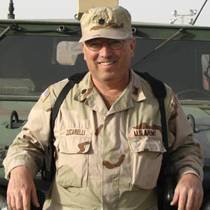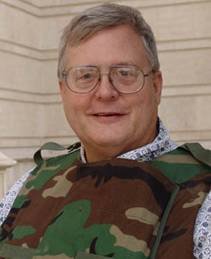There are a number of people who have seen both wars — men who served in Vietnam and now work in Iraq. In just a few weeks, I found more than 80 of these veterans working throughout Iraq. From 1964 to 1971 they served in the Army, Air Force, Marines, and Navy from the Gulf of Tonkin to the DMZ. Their present ages range from 51 to 70.
Their tours of duty in Iraq range from six months to more than 18.
In 1967, Buddy Algood was a second lieutenant with E Company, 3rd Battalion, 7th Infantry of the 199th Infantry Brigade near Binh Chan. Following the loss of his lower right calf and foot and recuperation from his injuries, he was the first amputee to graduate from the Airborne School at Fort Benning, Ga. A month later he returned to Vietnam.
Thirty-eight years later, as a civilian, Algood came to Iraq with the Project and Contracting Office (PCO). He explained that, in Iraq, part of his early work was “identifying reconstruction projects in 10 strategic cities that would put Iraqis to work and make an immediate improvement in their quality of life.”
.

Lt. Col. James Zucarelli is a member of the 42nd Infantry Division serving as liaison officer with the PCO. He was a Marine lieutenant in Vietnam 1968-69, and will leave Iraq at the age of 59.
“There are former Iraqi soldiers who will accept $25 dollars to take a potshot at a passing patrol, plant an IED by the road, or shoot a mortar from their backyard at night.”
.

Henry Bunting, lead acquisition analyst in the Joint Contracting Command – Iraq/Afghanistan, was a staff sergeant in Vietnam with Company A, 75th Support Battalion, 1st Brigade, 5th Infantry Division (Mechanized).
.

Chief Warrant Officer 5 Gregory McManus, a test pilot with the 135th Aviation Regiment in Iraq, has 39 years of flying with the Army under his belt. The Springfield, Mo., pilot flew helicopters in Vietnam from 1969 to 1970, during which he was shot down six times, he said. (Jeff Schogol / S&S)
CAMP ANACONDA, Iraq — His navigation systems had failed. Visibility was limited. And he could be heading toward the Iranian border.
Chief Warrant Officer 5 Gregory McManus, a test pilot with the 135th Aviation Regiment, said he wondered if he was about to end his 39-year career flying with the Army as the first American pilot shot down in Iran.
“For a few seconds, you kind of wondered, ‘I could have been retired,’ ” said McManus, 57.
The Springfield, Mo., man was a full-time pilot again after several years in the Missouri National Guard and one tour in Vietnam on active duty.
McManus said he feels “blessed by God” to be able to keep flying at his age.
“There’s not many pilots my age not in a state of decrepitude that can continue doing what I do,” he said. “I’m afraid if I stop, maybe I will become decrepit. My brain won’t work.”
McManus is modest about how he was able to land his plane without navigation systems.
“I just climbed up until somebody saw me on radar and told me where I was. I told them where I wanted to go and they gave me a direction and I flew that way until I got to where I think we were and landed uneventfully,” he said.
But his battalion commander gives him more credit for being able to get the stricken plane on the ground safely.
McManus was able to navigate the plane to safety using only a map, clock and compass, a method known as “dead-reckoning,” said Lt. Col. Mark McLemore, commander of the 3rd Battalion, 135th Aviation Regiment.
McManus joined the Army in 1967 and flew helicopters in Vietnam from 1969 to 1970, during which he was shot down six times, he said.
“First week I was there we got shot down … just took a hole in the oil line and just landed on the other side of the trees as soon as we knew we couldn’t fly. So a few of them were like that. A couple of them were more spectacular,” he said.
McManus said he was awarded the Distinguished Flying Cross after his gunship came upon an enemy regiment on the Cambodian border.
His helicopter took fire from all directions, but he and his crew used every weapon they had until they ran out of ammunition, he said.
“We ran out of rockets and machine-gun [bullets] first, and then the door gunners ran out of their ammo. I shot all my pistols and dumped everything else, threw all the grenades overboard at them. If there was anything on the aircraft, I would have thrown boxes of crud on them but I didn’t have anything else,” he said.
.
BAGHDAD, Iraq — Guerrilla warfare then: In the deep undergrowth of a jungle path, it was a trip-wire attached to a grenade.
Guerilla warfare now: In an Iraqi city, it’s an improvised explosive device (IED) planted beside a busy highway and detonated by cell phone from a nearby roof.
Brutality now: Three construction workers enroute to work were stopped and pulled from their vehicle. Two were shot in the head, the third was beheaded.
Surprise attack then: In Saigon, a smoke-spewing motorbike wove through heavy traffic and the rider threw a grenade into an open jeep before darting away.
Surprise attack now: A new BMW with a trunk full of explosives rams a convoy of up-armored HMMWVs.
And some things never change: A midnight mortar or rocket attack sounded the same at a forward operating base in Phu Bai in 1967 as it does in North Babil in 2006. An AK-47 or rocket-propelled grenade does the same damage whether the gunner is Viet Cong or Iraqi.

Got to hand it to those guys, they’re tough and courageous, to risk it all at their age.
Same thing in both wars, terrorism, whether it be boobie traps or IED’s, it’s designed to demoralize the troops as well as maim and kill. The differences in this war it seem that the enemy and it’s death cult is more willing to kill indiscriminately.
Hi Jack I agree, the terrorists worship death and the enemy in Nam did not.
What a bunch of retards.
John, go wring out your thong. Real men obviously scare you. BTW, I never knew a dickweed like you to have the balls to actually stick around and say your piece, you pussy. I hear your mother calling, she needs you to pick her bunions.
John or am I talking to a toilet. I shall call you toilet John.
Toilet John, I just got back from some errands or I would have deleted your post asap! ASAP, toilet John means as soon as possible.
But since a very dear friend of mine, Rhod, has already taken care of the situation much better then I could, I will let your comment stay.
Thank you Rhod, I agree with you Rhod this toilet John is a pussy.
WT:
No problem. John is a lefty jellyfish who falls to his knees for the worthless, and rises to indignation at his betters. I could write his life story. Community college liberal arts, failed relationship with parents (I should say again, mother and the loser of the paternity suit for father), the usual assortment of dysfunctions, syndromes and phobias. A hyper-loser.